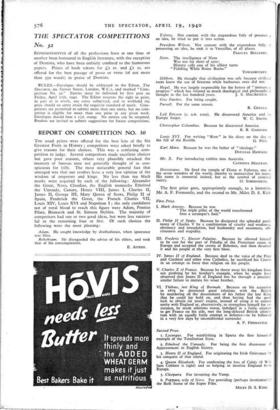REPORT ON COMPETITION NO. 30
THE usual prizes were offered for the best lists of the Six Greatest Fools in History ; competitors were asked briefly to give reasons for their choices. This was a confusing com- petition to judge. Several competitors made excellent choices but gave poor reasons, others very plausibly attacked the memory of famous men not generally thought of as con- spicuous for folly. The most noticeable general fact that emerged was that our readers have a very low opinion of the wisdom of emperors and kings. No less than ten black marks were acquired by each of the following : Alexander the Great, Nero, Claudius, the English monarchs Ethelred the Unready, Canute, Henry VIII, James I, Charles II, James II, George III, Mary Queen of Scots, Philip II of Spain, Frederick the Great, the French Charles VII, Louis XIV, Louis XVI and Napoleon I ; the only candidates not of royal blood to reach this figure were Adam, Pontius Pilate, Bismarck and St. Simeon Stylites. The majority of competitors had one or two good ideas, but were less success- ful in the remaining four or five. Of such choices the following were the most pleasing : Adam. He sought knowledge by disobedience, when ignorance was bliss.
Rehoboam. He disregarded the advice of his elders, and took that of his contemporaries.
E. AITKEN. Tolstoy. Not content with the stupendous folly of possessi: an idea, he tried to put it into action.
President Wilson.- Not content with the stupendous folly if possessing an idea, he took it to Versailles, of all places.
FRANCES BELLERBY.
Nero. The intelligence of Nero Was not far short of zero:
History calls one of his silliest turns
" Fiddling While Rome Burns." TOWANBUCKET.
Gibbon. He thought that civilisation was safe because civilised races knew the use of firearms while barbarous ones did not.
Hegel. He was largely responsible for the heresy of " immanent progress " which has vitiated so much theological and philosophical
thought in the last hundred years. J. S. MACARTHUR.
Guy Fawkes. For being caught.
Parnell. For the same reason. R. GRYLLS.
Leif Ericson (c. A.D. tow). He discovered America and let Europe forget. W. C. SMITH.
Christopher Columbus. Because he discovered America.
R. R. GARDNER.
Louis XVI. For writing " Rien " in his diary on the day of the fall of the Bastille.
Karl Marx. Because he was the father of " ideology."
DOUGLAS HAWSON.
Mr. X. For introducing rabbits into Australia.
CATRIONA MACLEAN.
Herostratus. He fired the temple of Diana at Ephesus, one of the seven wonders of the world, thereby to immortalise his name. His name is immortal indeed, but as the symbol of criminal vanity. 0. SOBERNHEIM.
The first prize goes, appropriately enough, to a historian, Mr. A. F. Fremantle, and the second to Mr. Miles D. S. Kirk.
First Prize.
I. Mark Antony. Because he was " The triple pillar of the world transformed Into a strumpet's fool."
II. Philip II of Spain. Because he dissipated the splendid patri- mony of Charles V by a combination of cruelty and weakness, obstinacy and irresolution, bad husbandry and meanness, offi- ciousness and stupidity.
III. Frederic V, Elector Palatine. Because he allowed himself to be cast for the part of Paladin of the Protestant cause in Europe and accepted the crown of Bohemia, and then deserted it and his people at ‘the very first blow.
IV. James II of England. Because deaf to the voice of the Pope and Cardinal and other wise Catholics, he sacrificed his Crown in an attempt to force that religion on his people.
V. Charles X of France. Because he threw away his kingdom from not profiting by his brother's example, when he might have observed that James II of England lost his through a precisely similar failure to imitate his wiser brother.
VI. Thibaw, last King of Burmah. Because on his accession in 1879 he destroyed good relations with the British by murdering all the descendants of his father the late King that he could lay hold on, and then having had the good luck to obtain. six years' - respite, instead of using it to restore amity with England or, alternatively, to strengthen himself for re- sistance, he made relations worse, indulged in a futile attempt to get France on his side, met the i long-delayed British ultima- tum with an equally futile attempt at defiance—to be followed in a very few days by unconditional surrender.
A. F. FREMANTLE.
Second Prize. , '
I. Lycurgus. For establishing in Sparta the first historical example of the Totalitarian State.
2. Ethelred the Unready. For being the first discoverer of Appeasement in English history.
3. Henry II of England. For originating the Irish Grievance by his conquest of that island.
4. Queen Elizabeth. For confirming the loss of Calais (if Wil- liam Cobbett is right) and so helping to insulate England from Europe.
5. Cleopatra For inventing the Vamp. G. Prrr.










































 Previous page
Previous page